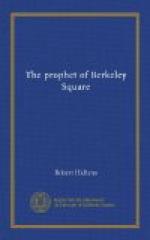“Oh, sir!” responded Mr. Ferdinand, in a shocked voice, “surely a London lad would not be found to tell a lie!”
“I hope not, Mr. Ferdinand. Still—did he look a nervous sort of lad?”
“He was a trifle pale, sir, about the gills—but a heart of gold, sir, I feel sure. He wore four medals, sir.”
“Four medals! Nevertheless, he may have been frightened to go to Mr. Malkiel’s door. That will do, Mr. Ferdinand.”
Mr. Ferdinand was about to bow and retire when the Prophet, after a moment of hesitation, added,—
“Stay, Mr. Ferdinand. Mrs. Merillia has gone to the Gaiety Theatre to-night. I expect her back at half-past eleven. She may need assistance on her return.”
“Assistance, sir! Mrs. Merillia, sir!”
Mr. Ferdinand’s luminous eyes shone with amazement.
“She may—I say she may—have to be carried to bed.”
Mr. Ferdinand’s jaw dropped. He gave at the knees and was obliged to cling to a Chippendale cabinet for support.
“Have an armchair ready in the hall in case of necessity and tell Gustavus to sit up. Mrs. Merillia must not be dropped. You understand. That will do, Mr. Ferdinand.”
Mr. Ferdinand endeavoured to bow, and ultimately succeeded in retiring. When his tremulous shoulders were no longer visible, the Prophet opened Marcus Aurelius, and, seating himself in a corner of the big couch by the fire, crossed his legs one over the other and began to read that timid Ancient’s consolatory, but unconvincing, remarks. Occasionally he paused, however, murmured doubtfully, “Will she have to be carried to bed?” shook his head mournfully and then resumed his reading.
While he thus employs his time, we must say a word or two about him.
Mr. Hennessey Vivian was now a man of thirty-eight, of excellent fortune, of fine connections, and of admirable disposition. He had become an orphan as soon as it was in his power to do so, having lost his father—Captain Vivian of Her Majesty’s Tenth Lancers—some months before, and his mother—who had been a Merillia of Chipping Sudbury—a few minutes after his birth. In these unfortunate circumstances, over which he, poor infant, had absolutely no control—whatever unkind people might say!—he devolved upon his mother’s mother, the handsome and popular Mrs. Merillia, who assumed his charge with the rosy alacrity characteristic of her in all her undertakings. With her the little Hennessey had passed his infantine years, blowing happy bubbles, presiding over the voyages of his own private Noah—from the Army and Navy Stores, with two hundred animals of both sexes!—eating pap prepared by Mrs. Merillia’s own chef, and sleeping in a cot hung with sunny silk that might have curtained Venus or have shaken about Aurora as she rose in the first morning of the world. From her he had acquired the alphabet and many a ginger-nut and decorative bonbon. And from her, too, he




